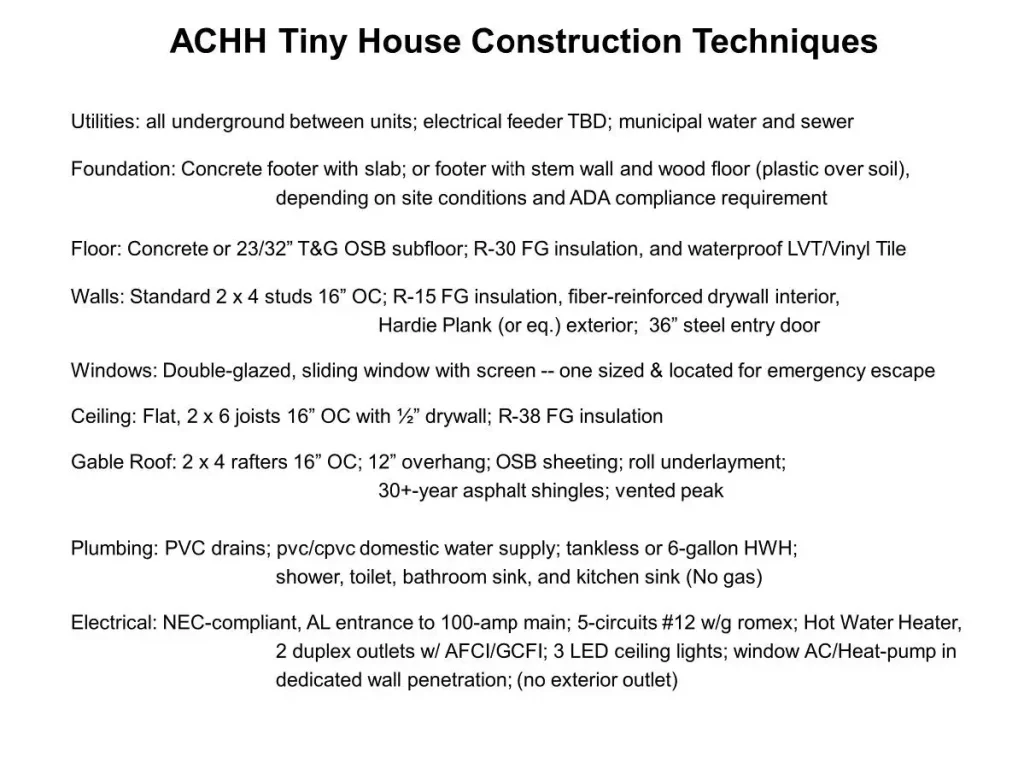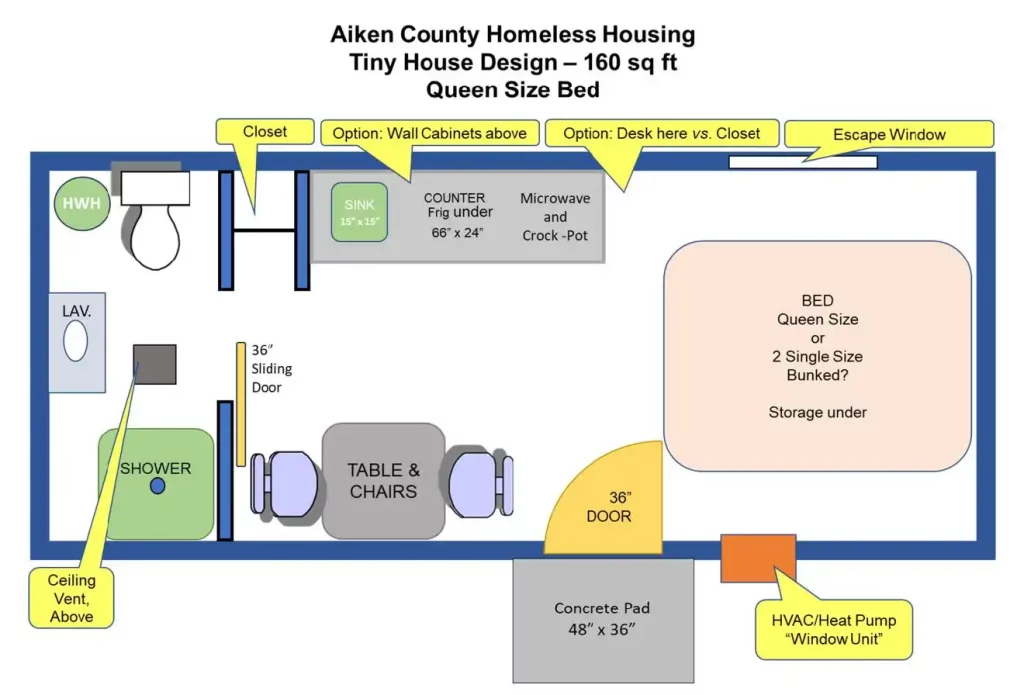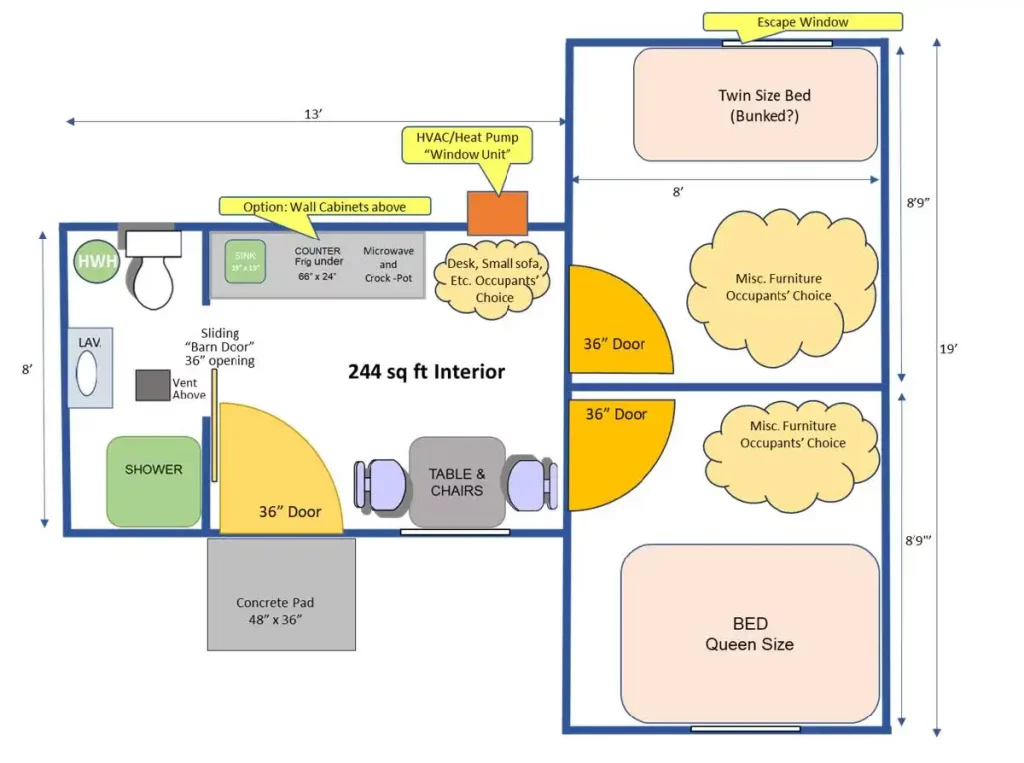About Us
Aiken County Homeless Housing (ACHH) was formed in 2021 as a corporation in South Carolina. We are a registered 501(c)(3) organization (tax ID: tax ID 86-2041218) with the mission of developing transitional housing for Aiken County’s homeless citizens.
History
ACHH was started as a spin-off from Aiken County Homeless Coalition after a survey of services for the homeless in 2019 – 2020 revealed a serious transitional housing shortage in the area. Tiny houses were determined to be the best approach to providing the desired attributes for transitional efforts as well as facilitating phased, privately-funded development. After considering the pro-s and cons of using shipping containers for transitional housing, ACHH settled on conventional “stick-built” 160- square foot house as our base model. The tiny house has a fully functioning bathroom, a small kitchen, a sit-down eating area and a bedroom area. Tiny house villages are being used is used successfully for transitional housing in many locations in the US.
A Board of Directors was formed in 2021. Potential areas appropriate for tiny house villages were identified. Discussions were started with both Aiken County officials and City of Aiken officials. A Zoning Ordinance rule setting a minimum dwelling size of 450-square feet was identified as a significant challenge. Efforts are now underway to modify the Zoning Ordinance to allow smaller houses for transitional housing. There is no similar restriction in Aiken County.
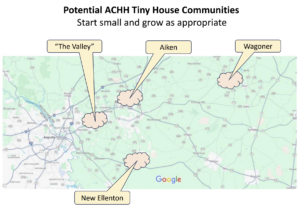
Outside the City Limits, we identified “The Valley” between Aiken and North Augusta as an area with both significant need for transitional housing and resources such as health care, food pantries, and grocery stores. Our early attempts to obtain land in this area proved unsuccessful. We are continuing efforts to find and obtain land, either free or at low cost, centrally located in The Valley.
A significant need for transitional housing was identified in New Ellenton and a potential location adjacent to a facility with a willing “operations” organization. City government expresses solid support for a tiny house community in the area, but has suggested a waiting period to allow other developments in the area before progressing to tiny house construction. We are waiting patiently for our turn.
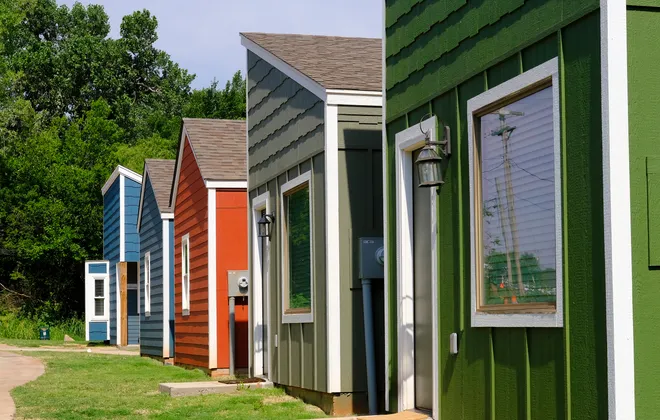
Aiken County Homeless Housing (ACHH)
The tiny house communities developed by ACHH are expected to operate as
longer term “transition housing” rather than short term shelter. Nationwide, the
“Housing First” strategy — providing unconditional, stable, private housing — has
been found to be an essential pre-requisite for making progress toward solving
whatever issues may be preventing a homeless individual from becoming a selfsufficient, contributing member of society.
Our Mission
Our mission is to conceive, design, and construct housing units for otherwise homeless citizens of Aiken County, South Carolina – including obtaining and developing land/real estate, obtaining permits, as required, and arranging for other organization(s) to beneficially operate the housing units. Upon completion of the housing units, it is expected that ownership will be transferred to a different suitable non-profit organization for day-to-day operation. We will not accumulate real estate assets .
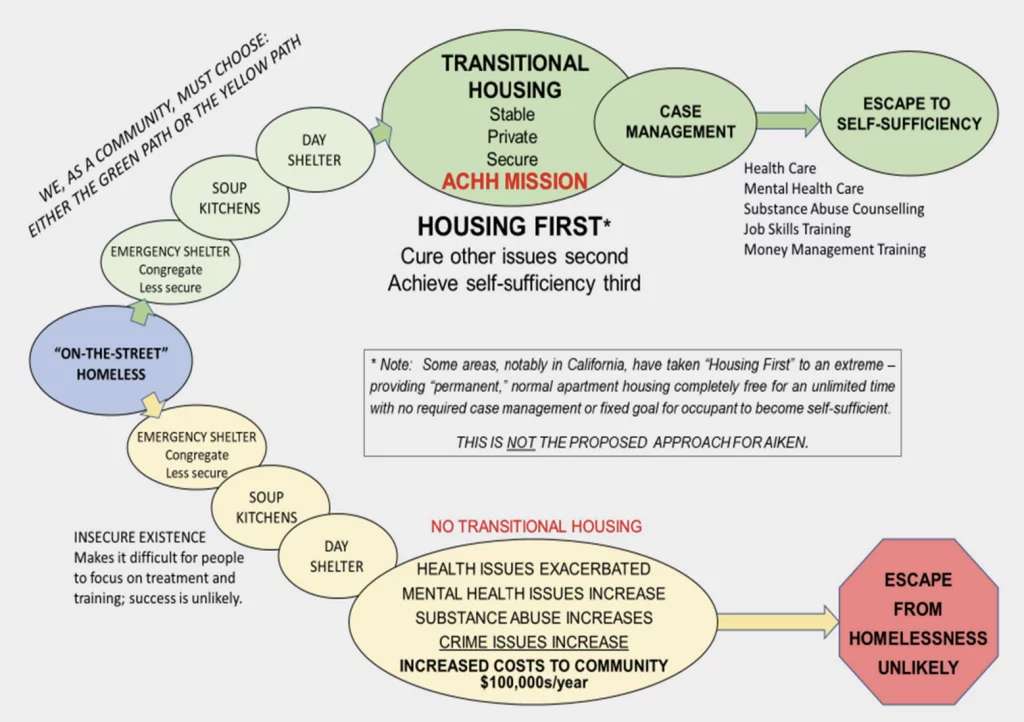
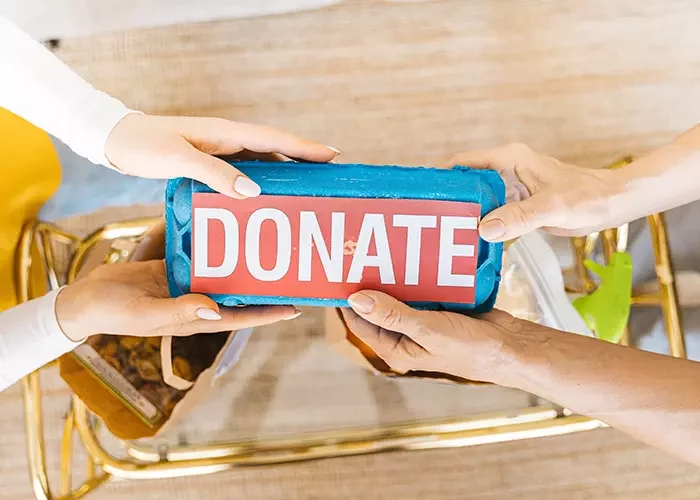
Aiken’s Homeless – growing numbers of all kinds
Homeless people are notoriously difficult to count. They aren’t eager to be identified as homeless and they don’t want to be counted. (If you were homeless would you be so eager?) Another challenge is that there are varying definitions of homelessness.
The best local numbers we have are from the McKinney-Vento program in Aiken County Public Schools. They are required to identify all homeless children in the district every year. Every year, they count hundreds – 300, 400, sometimes 500. Of course, some are from families with multiple children, some from single parent families, and most homeless adults are childless, making extrapolation to a specific number of homeless individuals impossible. But, the exact number doesn’t matter. We know the number is very large compared to the housing available to house them, or to say it rudely: to “Get them off the street.”
A formal report by the South Carolina Interagency Council on Homelessness indicates there was an 18% increase in homelessness from 2021 to 2022. Of course, it’s unlikely that Aiken had exactly that percentage increase, but it probably wasn’t far off. Reports from those who manage local soup kitchens report significant increases. As the rent for a one-bedroom apartment in Aiken approaches $1000 per month (utilities included), it won’t be long before housing cost exceeds the total monthly take-home of someone diligently working 40-hours per week at our state’s $7.25 -per-hour minimum wage. As rent inflation continues, increases in homelessness can be expected to continue.
The Interagency Council on Homelessness reported the following demographics for South Carolina’s homeless: Single adults 85%; male 60%; children 20% (average age 8-years old); 2500 veterans; and 1500 domestic violence victims. About 50% were homeless 6-months or less; 30% were homeless 12-months or more; and 20% are so-called “chronic homeless” perpetually un-housed year after year. If we simply assume that Aiken County’s share of homeless is the same as it’s share of overall population, we find that there are 500 homeless individuals in Aiken County.
We need not be overly worried that two dozen tiny houses will attract homeless folks to come to Aiken. First, because it is expected that the tiny houses will not be made available to those who haven’t lived in the Aiken area (whether homeless or not) for at least two-years; and second, because national statistics indicate that some 90% of homeless citizens stay in their home communities. Given Aiken’s shortage of housing for the homeless compared to that in surrounding municipalities, if housing availability drove migration, Aiken’s homeless would have long since departed for Greenville, Columbia, or Augusta — or, even Orangeburg or Florence. We can be confident that the large majority of Aiken’s homeless citizens are, indeed, Aiken’s homeless citizens.
So, without debating exact numbers, it’s clear that the 25 or so homes proposed in a single community of tiny houses in City of Aiken won’t make a big dent in Aiken’s challenge to house the unhoused. But it can make a big difference to the individuals that transition to a new life.
2022 State of Homelessness Report Draft Final (schomeless.org)
Housing already available for Aiken’s Homeless
It’s obvious that Aiken needs more housing directed at providing respite for our homeless citizens. The Salvation Army does what it can with its one emergency shelter, but it’s too small compared to the need and most of those lucky enough to get in are allowed to stay a only a fairly short time. Further, the congregate nature of the shelter (necessary to house relatively large numbers compared to the size of the building), does not provide the high-level of safety, security, and peace-of-mind that is best for effective transition out of homelessness.
Yes; multi-family housing developers in the city often commit to build so-called “affordable housing”, but there are three reasons that it isn’t much help: First, only a small fraction of the constructed developments (typically in the single digits) are set aside as “affordable.” There are long waiting lists. Second; Landlords typically want first and last-months’ rent and sometimes a separate deposit up-front – something that few of our poorest citizens have in savings; and third, even the “affordable rents” are not affordable on the lowest rungs of the economic ladder – and if they show up with a “Housing Choice Voucher” from HUD (previously known as a Section 8 Voucher), they are often turned away because landlords don’t want to deal with government red tape or similar reason.
Similarly, there are very long wait lists to be accepted in so-called “public-housing.” Wait lists represent years-long delays before our homeless citizens get a roof over their heads.
So, without debating exact numbers, it’s clear that the 25 or so homes that are proposed in a single community of tiny houses won’t make a big dent in the challenge to help Aiken’s unhoused get back on their feet.
Transitioning from Homelessness – Housing First
Did you ever wonder what it would be like to be homeless, perfectly sane, and wanting to go get a job? Close your eyes and imagine for a moment: you don’t have a place to get out of the weather, except in a tent in the woods, or an abandoned house – likely with several other homeless folks. Maybe you’re a woman and those around you are single, homeless men. Because of the discomfort of sleeping on the ground in the heat or the cold, combined with the stress of worrying that you would be attacked or your belongings would be stolen, you try to sleep with one-eye open all night. In the morning, there’s no running water to wash your face, and you have to defecate behind the nearest bush. There’s no place to shower and you’re aware that your body odor would be offensive to anyone who interviews you. There’s no place to keep your clothing neat; maybe you were lucky enough to wash clothes two weeks ago, but the clothes are now wrinkled and emit a distinct odor. Because your back-pack was stolen from your tent a month ago, you no longer have an ID that most employers require.
How successful do you think you would be getting a job, attending job training, or pursuing healthcare or substance abuse treatment (counselling) in such a state. It’s no wonder that the longer a person is homeless, the more likely it is that they have mental health and/or substance abuse issues – even if they had none when they became homeless.
It’s long been understood that before we can expect individuals to “fix” the issues that drive their homelessness, we need to provide housing – the shelter that Maslow identified as the foundational element of reasonable human existence. “Housing First” has been US government policy for decades – promoting the notion that housing should be provided first, before asking an individual to pursue recovery from mental health, substance abuse, or other challenges. Providing housing, like the proposed tiny houses, gives the resident the safety, security, and a bit of comfort as the foundation on which to build recovery from their other challenges. It’s often said that there will be no pre-requisites for Housing First, but, in reality, there would be some limitation for people inclined to violence and other significant criminal activity.
Some places suggest that housing provided under the Housing First banner is to be free and “permanent,” with no requirement that residents attempt to address their personal challenges. Such is not the approach being proposed in Aiken. Rather, it is expected that residents will pay rent on the basis of ability to pay — typically in the range of $100 to $200 per month. Further, residents will be expected to follow a process of care, counselling, and training over a reasonable period of time that enables them to re-join productive society. The program and schedule would be developed jointly by the resident and a case manager. If the resident refuses to participate effectively in the program, he or she may be asked to leave the tiny house community. That’s Housing First; serious and comprehensive effort to transition Second; and taking part in productive society Third.
There will be some of the chronically homeless who will not be able to succeed in the tiny house transition program proposed for Aiken. These individuals deserve some other program and facilities provided by a combination of local, state, and federal governments to allow them to live with safety and self-respect. The proposed tiny house community is not a suitable place for them.
Financial aspects of Housing First
Some people, think of providing housing for the homeless as an expensive proposition. In some ways it is; in some it’s not. In this case, the Aiken County Homeless Housing organization plans to ask very little of City of Aiken taxpayers.
Recently, United Housing Connections, a housing non-profit in Greenville, supported by the South Carolina Department of Revenue and Fiscal Affairs, compared the taxpayer cost of supporting a homeless person on-the-street and one in a Housing First program. The cost when “on-the-street” was found to be over $19,000 per year per person. The cost housed is about $2000 per person per year. The big difference is related to cost of short-term incarceration and emergency health care for the individual on-the-street. The large recurring cost for a homeless citizen on-the-street is a greater financial consideration than the cost of providing housing.
Housing First Impact Slides (schomeless.org)
While ACHH looks to City of Aiken for support and facilitation in identifying and obtaining an appropriate parcel of land for the tiny house community, then zoning and building permit approval, followed by site preparation, utility connections, etc. After that, it is planned and expected that the tiny houses themselves will be sponsored – material costs covered and most construction labor provided by volunteers – by a variety of churches, civic organizations, and area businesses. Donations from concerned citizens will be sought to cover any other expenses.
Based on the experience at Savannah’s tiny house community, rent from the residences is expected to cover utility and maintenance costs. The cost for on-going administration, including the case manager is expected to be covered by the organizations involved. A substantial commitment of funds from the Bishop of Charleston is already in-place to address this cost.
City of Aiken is getting a very good deal – a significant reduction in costs for supporting folks on the street while providing very little of the funding for constructing and operating the tiny houses.
Proponents are Proceeding Cautiously
Aiken County Homeless Housing is proceeding cautiously. For example, they are waiting to see if the Zoning Ordinance will get fixed before they commit to a particular location in the City for building a tiny house community. They are waiting to undertake significant fund-raising until Zoning is clear and a site is certain.
At first, a building permit will be sought to build a small number of tiny houses –likely 5 or 6, depending on site layout and financial support.
Already, conversations are underway to identify non-profit organizations that will, individually or as a group, provide site and case management to make the tiny house community a success.
Lessons learned from construction and occupancy of the tiny houses will be used to adjust the design and construction approach prior to building more tiny houses.
Lessons learned from the operation and case management programs will be adopted as agreements are put in place for operation of the expanded tiny house community.
In the extreme, if the tiny house approach doesn’t seem to be working, Aiken County Homeless Housing is committed to re-imagining the approach to providing transitional housing for our homeless citizens. We won’t go away, but we will find a different path for success.
Other Communities are Proving the Concept
Tiny house villages to house the un-housed have sprung up in many communities over the past ten years or so. They’re on the West Coast, in the Midwest, and in the Northeast, and in the South.
Some are only 60-square feet per unit – just a heated bedroom for one or two individuals. Bathrooms and kitchens are congregate facilities shared by all who live in the community. Portland Oregon built several of these communities.
Some are a few hundred square feet per unit for extended occupancy by families of four or more with fully functional bathrooms and kitchens. Ithaca, New York and Florence, South Carolina are following this model.
There are many communities similar to the ones proposed for Aiken having 200 square feet or less for one or two residents with fully functional bathroom, a somewhat limited kitchen, and a bedroom that also serves as the space to relax and watch TV. A growing community in Kansas City catering exclusively to veterans uses this model as does a community of 48 houses of 130 square feet each in Savannah, Georgia. The Savannah community is so successful that another 48 tiny houses are being built – open to all homeless; not just veterans. The Kansas City veterans community is so successful that the organization that developed it is replicating it in six cities scattered from Sioux Falls, South Dakota to Oklahoma City, Oklahoma.
It’s obvious that the tiny house concept proposed for Aiken is a winner. City Council should support the proposal by making the necessary changes to the Zoning Ordinance.
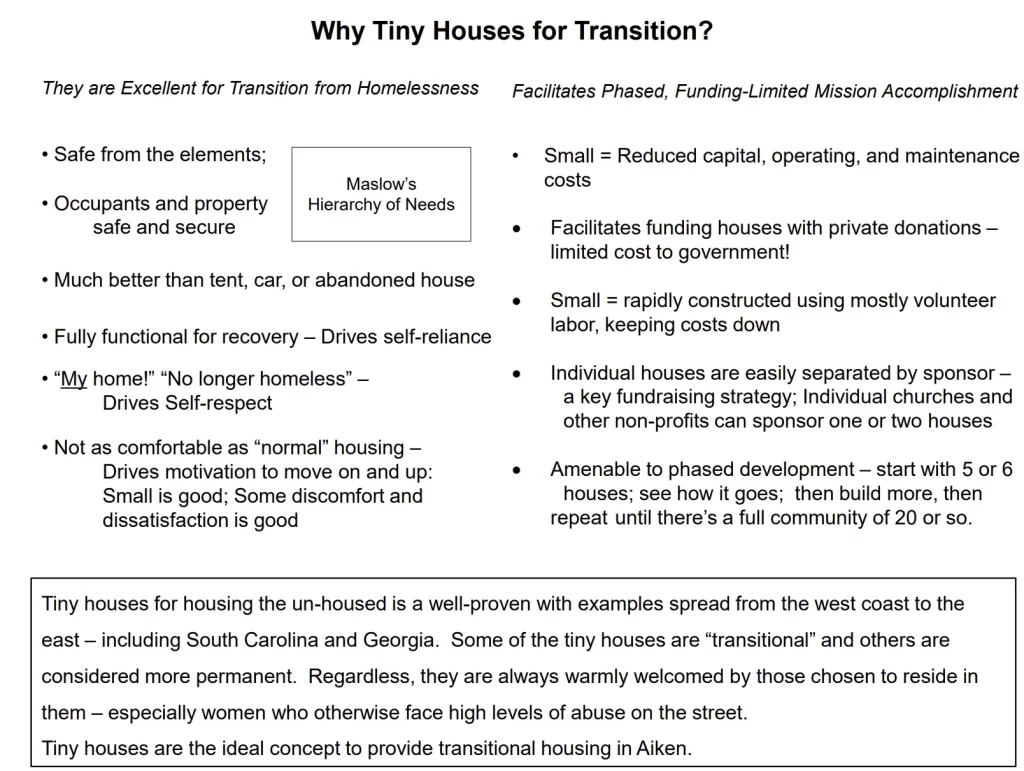
What Will the Tiny Houses Look Like?
NOTE: House design shown is dimensioned to resemble a travel trailer. Final design may be closer to square.
